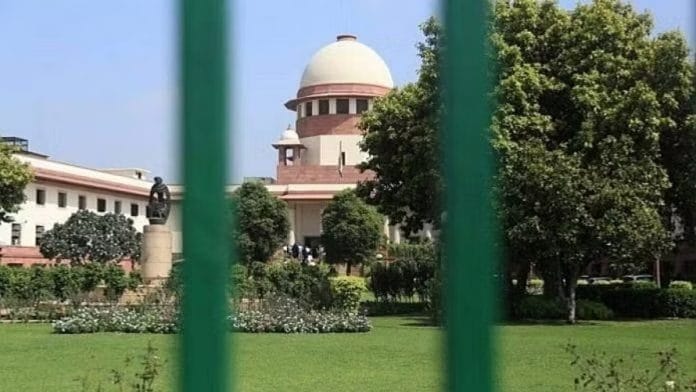New Delhi: In marriage, there exists an expectation of sexual access to a spouse, but a husband cannot coerce his wife into having sex against her will. Given such expectations “are completely absent in the case of a stranger”, non-consensual sex in the marital sphere must be distinguished from that taking place outside it, the Centre has argued in the Supreme Court.
The Union home ministry made the arguments in an affidavit submitted before the Supreme Court Thursday to oppose a batch of petitions seeking to criminalise marital rape in India.
By way of the affidavit, which runs up to 49 pages, the Centre told the Supreme Court that within the institution of marriage, there exists a continuing expectation from both spouses to have reasonable sexual access to the other.
Underlining that the husband “certainly does not have any fundamental right” to violate his wife’s consent, the Centre said that linking a crime such as “rape” to the institution of marriage can arguably be considered “excessively harsh” and “disproportionate”.
“Though these expectations do not entitle the husband to coerce or force his wife into sex, against her or his will. At the same time, it is submitted — these obligations, expectations and considerations, which are completely absent in the case of a stranger who seeks sexual congress or even from any other intimate relationship, constitute a sufficient basis for the legislature to distinguish qualitatively between an incident of non-consensual sex within the marital sphere and without it,” the affidavit said.
The Centre cited the 172nd report of the Law Commission of India to support its argument. On the subject of the review of rape laws, the report referred to “exception 2” of Section 375 of the Indian Penal Code.
The exception entails an exemption from the offence of rape for sexual intercourse or acts by a man with his wife, provided that she is over 15 years of age. “We are not satisfied that this exception should be recommended to be deleted since that may amount to excessive interference with the marital relationship,” the law commission report, which came out in March 2000, stated.
The Centre stated that striking down “exception 2” on the ground of whether it is constitutionally valid will have a far-reaching effect on the institution of marriage if sexual intercourse or sexual acts by a man with his wife are made punishable as “rape”.
“It may severely impact conjugal relationships and lead to serious disturbances in the institution of marriage. In the fast-growing and ever-changing social and family structure, misuse of the amended provisions can also not be ruled out as it would be difficult and challenging for a person to prove whether consent was there,” the affidavit by the Centre stated.
Saying that the issue was a “social” rather than a legal one, the Centre said it could not be decided without proper consultation with all stakeholders or considering the views of all states.
According to the affidavit by the Centre, the question of criminalisation or decriminalisation of any act, commission or omission by persons residing within the country forms a part of the “plenary legislative policy”, which depends upon various socio-economic and political factors falling outside judicially manageable standards. Stating this, the Centre said that the scope of judicial review, in such cases, ought to be suitably tailored.
Drawing attention to alternate legal remedies available to women under the law, the Centre cited sections 354, 354A, 354B, and 498A of the IPC, 1860. These sections deal with assault or criminal force on a woman with intent to outrage her modesty; sexual harassment and punishment for it; assault or use of criminal force on a woman with intent to disrobe; and cruelty meted out on a woman by her husband or his relative.
The Centre also mentioned the provisions of the Protection of Women from Domestic Violence Act, 2005. For instance, Section 3(a) defines domestic violence as any act, omission or commission, or conduct of the respondent” that harms or injures or endangers the health, safety, life, limb, or well-being, whether mental or physical, of the aggrieved person. It includes causing physical, sexual, verbal, emotional, and economic abuse.
“Exception 2” of Section 63 of Bharatiya Nyaya Sanhita (BNS), which replaced the IPC, also provides the exemption from the offence of rape within the institution of marriage.
Nearly two years ago, in May, a two-judge bench of Justices Rajiv Shakdher and C. Ravi Shankar of the Delhi High Court gave a split verdict on whether marital rape should be a criminal offence.
Subsequently, the case reached the Supreme Court, where a three-judge bench led by Chief Justice of India (CJI) Dhananjaya Y. Chandrachud has been hearing the case.
(Edited by Madhurita Goswami)
Also read: Marital rape exception applies to anal sex, cannot charge husband under Section 377 — Uttarakhand HC






